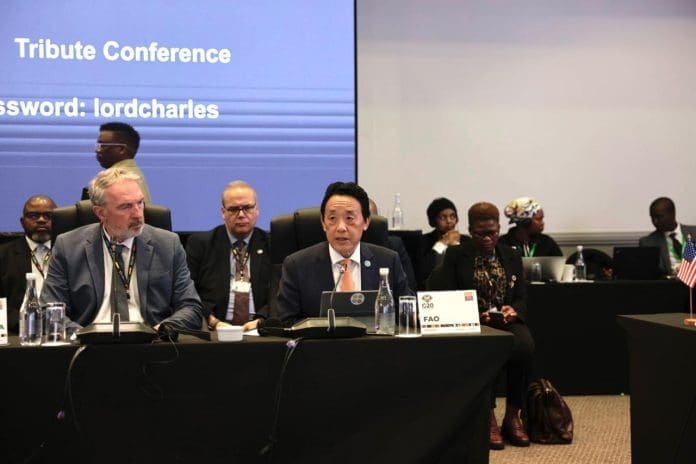
Global leaders must coordinate urgent action to address persistent hunger affecting 673 million people worldwide as climate shocks increasingly threaten agricultural productivity, the Food and Agriculture Organization of the United Nations (FAO) warned during Group of 20 (G20) agriculture ministers meetings in Cape Town.
QU Dongyu, FAO Director-General, addressed ministers from the world’s largest economies at the September 18-19 gathering hosted by South African Agriculture Minister John Steenhuisen under the theme focusing on data-driven approaches to food security and inclusive agricultural investment.
The meeting occurred against a backdrop of overlapping global crises pushing millions deeper into hunger and poverty. Current data shows 8.2 percent of the global population experienced hunger in 2024, representing a modest decline from 8.5 percent in 2023, though significant regional disparities persist.
Africa remains the most affected continent, where hunger continues rising despite global improvements. Progress was not consistent across the globe, as hunger continued to rise in most subregions of Africa, threatening to undermine international development goals.
The Director-General emphasized that achieving Zero Hunger while maintaining the 1.5 degrees Celsius climate target requires an estimated $1.1 trillion annually until 2030 for mitigation and resilience measures. Current agrifood systems rank among the most vulnerable to climate disruptions, with droughts, floods, storms, and rising temperatures undermining productivity and disrupting supply chains.
QU identified four critical areas where G20 nations can provide essential leadership: scaling innovation and digitalization, increasing sustainable investment, improving data transparency and market functioning, and promoting integrated policy approaches.
The State of Food Security and Nutrition in the World (SOFI) 2025 Report, prepared jointly by FAO, International Fund for Agricultural Development (IFAD), United Nations Children’s Fund (UNICEF), World Food Programme (WFP) and World Health Organization (WHO), revealed both concerning trends and signs of progress.
The declaration noted that global hunger levels declined slightly last year, with between 638 and 720 million people affected in 2024 — 15 million fewer than in 2023, according to commitments secured at the Cape Town meeting.
However, current trajectories suggest more than 512 million people will remain hungry by 2030 if trends persist, with nearly 60 percent concentrated in Africa. The report highlighted that 90 million more people face hunger today compared to 2020 levels.
Beyond acute hunger, approximately 2.3 billion people experienced moderate or severe food insecurity in 2024, while over 190 million children under five suffer from undernutrition affecting their physical and mental development potential.
The FAO’s Hand-in-Hand Initiative continues supporting the poorest countries by matching them with investment opportunities, providing practical frameworks for addressing systemic agricultural challenges.
South African hosting of the G20 agriculture ministerial meeting underscored regional leadership in addressing food security challenges. Minister John Steenhuisen has stressed the need for investment in climate-smart agriculture such as drought-tolerant seed, reflecting continental priorities.
Climate change impacts intensify pressure on agricultural systems already struggling with productivity constraints. The global roadmap indicates transformation toward more efficient, inclusive, resilient and sustainable agrifood systems requires unprecedented coordination among major economies.
The meeting’s data-driven approach emphasis reflects growing recognition that evidence-based decision making must guide policy interventions in addressing food security challenges across diverse economic and environmental contexts.
QU concluded by calling for renewed collective resolve to build agrifood systems capable of nourishing all people while protecting planetary resources, positioning the G20 as essential to achieving these ambitious but necessary goals.
Source: newsghana.com.gh










